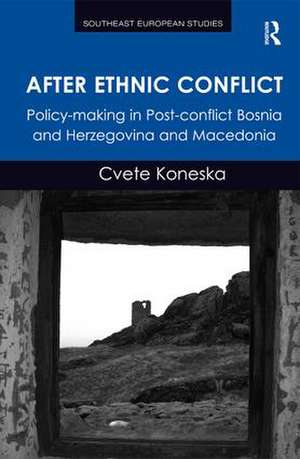After Ethnic Conflict: Policy-making in Post-conflict Bosnia and Herzegovina and Macedonia: Southeast European Studies
Autor Cvete Koneskaen Limba Engleză Hardback – 17 dec 2014
Din seria Southeast European Studies
-
 Preț: 312.22 lei
Preț: 312.22 lei -
 Preț: 489.26 lei
Preț: 489.26 lei - 9%
 Preț: 1039.73 lei
Preț: 1039.73 lei - 18%
 Preț: 1000.27 lei
Preț: 1000.27 lei - 18%
 Preț: 994.95 lei
Preț: 994.95 lei - 12%
 Preț: 312.43 lei
Preț: 312.43 lei -
 Preț: 383.12 lei
Preț: 383.12 lei - 19%
 Preț: 241.15 lei
Preț: 241.15 lei -
 Preț: 351.66 lei
Preț: 351.66 lei -
 Preț: 383.12 lei
Preț: 383.12 lei -
 Preț: 379.77 lei
Preț: 379.77 lei -
 Preț: 384.86 lei
Preț: 384.86 lei - 18%
 Preț: 1006.92 lei
Preț: 1006.92 lei - 28%
 Preț: 821.29 lei
Preț: 821.29 lei -
 Preț: 381.98 lei
Preț: 381.98 lei -
 Preț: 385.84 lei
Preț: 385.84 lei -
 Preț: 383.68 lei
Preț: 383.68 lei -
 Preț: 411.42 lei
Preț: 411.42 lei -
 Preț: 385.62 lei
Preț: 385.62 lei - 31%
 Preț: 764.69 lei
Preț: 764.69 lei -
 Preț: 381.43 lei
Preț: 381.43 lei - 26%
 Preț: 764.20 lei
Preț: 764.20 lei -
 Preț: 361.13 lei
Preț: 361.13 lei - 18%
 Preț: 999.19 lei
Preț: 999.19 lei -
 Preț: 382.54 lei
Preț: 382.54 lei - 17%
 Preț: 241.15 lei
Preț: 241.15 lei - 19%
 Preț: 241.15 lei
Preț: 241.15 lei - 31%
 Preț: 767.67 lei
Preț: 767.67 lei -
 Preț: 469.34 lei
Preț: 469.34 lei - 18%
 Preț: 1000.45 lei
Preț: 1000.45 lei
Preț: 849.05 lei
Preț vechi: 1216.60 lei
-30% Nou
Puncte Express: 1274
Preț estimativ în valută:
162.48€ • 176.43$ • 136.49£
162.48€ • 176.43$ • 136.49£
Carte tipărită la comandă
Livrare economică 22 aprilie-06 mai
Preluare comenzi: 021 569.72.76
Specificații
ISBN-13: 9781472419798
ISBN-10: 1472419790
Pagini: 198
Dimensiuni: 156 x 234 mm
Greutate: 0.53 kg
Ediția:1
Editura: Taylor & Francis
Colecția Routledge
Seria Southeast European Studies
Locul publicării:Oxford, United Kingdom
ISBN-10: 1472419790
Pagini: 198
Dimensiuni: 156 x 234 mm
Greutate: 0.53 kg
Ediția:1
Editura: Taylor & Francis
Colecția Routledge
Seria Southeast European Studies
Locul publicării:Oxford, United Kingdom
Recenzii
’This book offers an extremely interesting comparative perspective on the crucial questions of when, why and how ethnic elites choose to cooperate with each other in the aftermath of violent conflict. It contains important insights not just for those working on the Balkans but for scholars examining post-conflict reconciliation and state building more widely.’ James Ker-Lindsay, London School of Economics, UK ’Cvete Koneska delivers a very convincing comparative account of post-conflict decision making in the Balkans. Her approach discusses variance in policy making outcomes, and assesses successes and failures of the politics of power-sharing and elite accommodation. A must-read for those who seek a deeper, sectoral understanding of how local elites operate within ethnically polarised contexts.’ Othon Anastasakis, University of Oxford, UK 'Cvete Koneska has written an engaging and nuanced text, which offers fresh insights on the extent of ethnic accommodation in two post-conflict ethnically divided societies. ... After Ethnic Conflict should be widely read, not just by Balkan scholars but also by power-sharing theorists and others interested in how to encourage ethnic accommodation in divided societies.' Reviews and Critical Commentary
Notă biografică
Cvete Koneska holds a DPhil in Politics from St Antony’s College, Oxford. Her research is focused on post-conflict politics, ethnically divided societies, and regional security dynamics in Southeast Europe. She is also interested in policy analysis, an interest acquired as a Research fellow at Analytica think tank in Skopje, Macedonia.
Cuprins
Part I Introduction; Chapter 1 After Ethnic Conflict: Why Look at Post-conflict Recovery?; Chapter 2 Explaining Ethnic Accommodation; Part II Historical and Institutional Background; Chapter 3 Bosnia 1991–1996: From Communism to Ethnic Conflict; Chapter 4 Macedonia 1991–2001: Simmering Ethnic Tensions; Part III What Makes Post-conflict Politics Work; Chapter 5 Military Reform in Bosnia: A Single Joint Army; Chapter 6 Decentralisation in Macedonia: Designing Municipal Maps and Funds; Part IV Continuing Challenges: Persisting Ethnic Tensions After Conflict; Chapter 7 Police Reform in Bosnia: Ethnicity above Efficiency; Chapter 8 Minority Education in Macedonia: Recurring Ethnic Tensions; Chapter 9 Conclusions;
Descriere
After Ethnic Conflict: Policy-making in Post-conflict Bosnia and Herzegovina and Macedonia investigates how sensitive policy issues can be resolved in the aftermath of war by investigating how political elites interact and make decisions in ethnically divided societies. Focusing on the interactions between political elites and attempts to reach agreement across ethnic lines in Bosnia and Macedonia the book examines the impact that institutional factors can have on political actors and the decisions they make.
